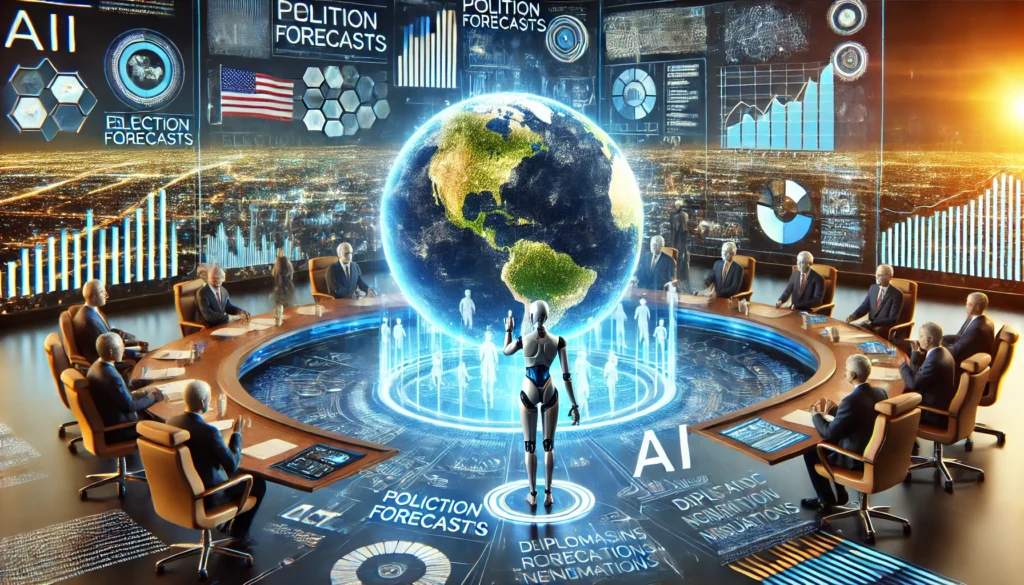Artificial Intelligence has become a force to be reckoned with, and it’s not just changing your Instagram feed or how your phone suggests new music. In 2025, AI is redefining the entire landscape of global politics, influencing everything from elections to international diplomacy, and policy-making to political forecasting. In short, if you’re not paying attention to AI’s impact on politics, you’re already behind the curve.
1. AI in Government: The Rise of Smart Policies
It’s not just sci-fi anymore. Governments around the world are starting to use AI to streamline decision-making and manage public services. AI in government means everything from automated public services (think AI chatbots handling your taxes) to using machine learning algorithms to design smarter, more efficient policies. In fact, Artificial Intelligence has already been used in countries like Estonia, where their e-residency program allows anyone to start and manage a business online through secure digital IDs.
What’s the real kicker? AI is helping create “smart policies”—policies that can adapt in real time. Instead of lawmakers getting bogged down in debates, AI could analyze data and recommend policy adjustments on the fly. This means faster responses to crises, better allocation of resources, and, ultimately, policies that can evolve with the needs of the people.
But hold up, isn’t this risky? Of course, it is. Handing over policy decisions to algorithms raises questions about accountability. Who’s responsible if the algorithm makes a mistake? Governments need to balance the benefits of efficiency with the need for human oversight.
2. Artificial Intelligence and Political Forecasting: Accuracy or Fiction?
One of the most exciting (and terrifying) aspects of AI’s role in politics is its ability to forecast political events. Organizations already use AI-driven predictive analytics to anticipate election outcomes, predict shifts in public opinion, and forecast geopolitical conflicts. Artificial Intelligence analyzes vast amounts of data—social media trends, demographic changes, and economic indicators—to forecast voter behavior and policy impacts.
Political analysts already use Artificial Intelligence to crunch numbers on mid-term election results and national sentiment. By processing real-time data, AI often makes more accurate predictions than human analysts.
But AI isn’t perfect. Data bias can throw off predictions. If the data fed into the system is skewed or incomplete, the results are, well, garbage. AI-driven political forecasting needs to be approached with caution, especially when used to make high-stakes decisions.
3. Automation’s Impact: The Political Economy of AI
One of the most disruptive ways Artificial Intelligence is reshaping politics is through automation. Automated processes are increasingly replacing human workers in various sectors, from manufacturing to retail to even the service industry. As jobs are replaced by robots and algorithms, governments are faced with tough questions about how to deal with job displacement and economic inequality.
The US, China, and the EU are already exploring universal basic income (UBI) to address the economic fallout of widespread automation. Some believe UBI can provide a safety net for workers losing jobs to automation, while others worry about the long-term sustainability of such programs.
Here’s the thing: Automation is making some sectors more efficient, but it’s also widening the income gap. While high-skilled workers in tech and AI fields benefit, many low-skilled jobs are disappearing. In short, AI is raising questions about the future of work and how societies will adapt to this new reality.
4. AI in Election Campaigns: A New Frontier of Manipulation?
Let’s talk about AI’s role in election campaigns—because you know it’s coming. AI already creates hyper-targeted ads, predicts which voters need persuasion, and tailors political messages to specific personalities. Election campaigners now use Artificial Intelligence to micro-target voters, analyzing their social media activity and online shopping habits to determine exactly how to appeal to them.
In 2025, expect political campaigns to get even more sophisticated. AI-driven deepfakes and voice mimicking technologies could allow candidates to craft seemingly authentic messages with no regard for the truth. It’s a double-edged sword: Artificial Intelligence has the potential to revolutionize campaigning, but it also makes manipulation and misinformation easier than ever.
What to watch for: The potential rise of AI-fueled political manipulation, particularly in vulnerable communities or swing states. This is a topic that’s already drawing concern from policymakers and watchdog groups, as AI-enabled deception could undermine democratic processes.
5. Artificial Intelligence and Global Diplomacy: The Power Play of the Future
AI isn’t just making waves in national politics—it’s also transforming the global political landscape. It is being used in diplomacy to predict the outcomes of international negotiations, analyze geopolitical risks, and even shape foreign policy decisions.
Take, for example, the US-China trade talks. Artificial Intelligence has been used to analyze trade data and predict the outcome of trade negotiations, potentially giving countries an upper hand in high-stakes negotiations. AI-driven diplomatic tools could help manage international conflicts and predict military escalation, making diplomacy more data-driven and informed.
What to watch for: Countries will continue to invest heavily in AI-powered tools for international negotiations and military strategy. As AI evolves, we may see more AI-driven diplomatic initiatives—but also more AI-powered military technologies that could reshape the future of warfare.
Final Thoughts: The Political Revolution Is Here
Artificial Intelligence in politics isn’t a futuristic concept anymore—it’s happening right now. Whether it’s through automation, predictive forecasting, or reshaping global diplomacy, AI is driving a political revolution in 2025. But with power comes responsibility, and as AI becomes more integrated into political systems, we’ll need to be vigilant about its potential to manipulate, deceive, and disrupt.
As we move forward into 2025, one thing is clear: if we’re not careful, AI could reshape global politics in ways we can’t even predict. The revolution has begun—and it’s up to us to decide how to navigate it.


